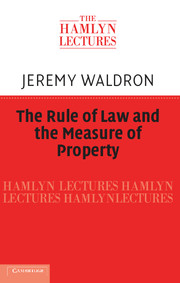3 - In defense of legislation
Published online by Cambridge University Press: 05 August 2012
Summary
The first lecture in this series used the facts of an American case, Lucas v. South Carolina Coastal Council, to pose a question about the possibility of a special relation between private property and the ideal we call the Rule of Law. The case concerned a property developer, who bought ocean-front real estate intending to develop it as residential property for resale. Unfortunately (or fortunately, depending on your point of view), his plans were thwarted by new environmental regulations intended to protect the coastline from erosion. The developer sued under the Takings Clause of the US Constitution, on the ground that the regulations deprived his property of all or almost all of its value, and his argument was accepted by a majority in the Supreme Court of the United States.
I said that I was not interested in arguing about American constitutional law, but that I wanted to use the facts of Lucas v. South Carolina Coastal Council to raise a question about the relation between private property and the Rule of Law. Is the property developer’s complaint one that can be made in the name of the Rule of Law? Can he proceed with it on the assumption that the Rule of Law should protect his property against this sort of regulation? Or is the ideal of the Rule of Law neutral in this matter, given that there is law on both sides of the equation – law inasmuch as Mr. Lucas’s property rights are legal rights but law also inasmuch as the restriction on development that he faces represents the application of a properly enacted statute?
- Type
- Chapter
- Information
- The Rule of Law and the Measure of Property , pp. 76 - 111Publisher: Cambridge University PressPrint publication year: 2012



